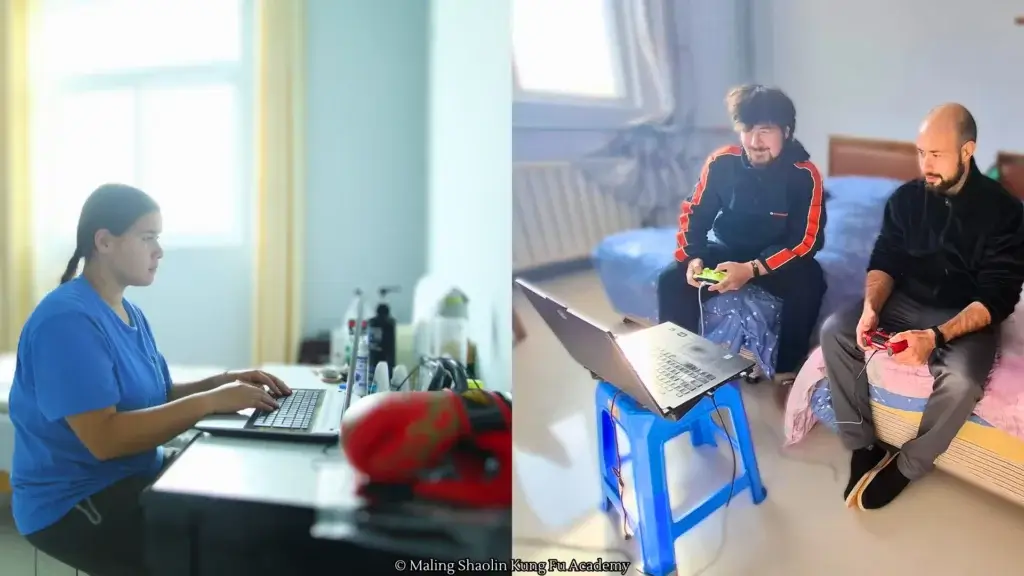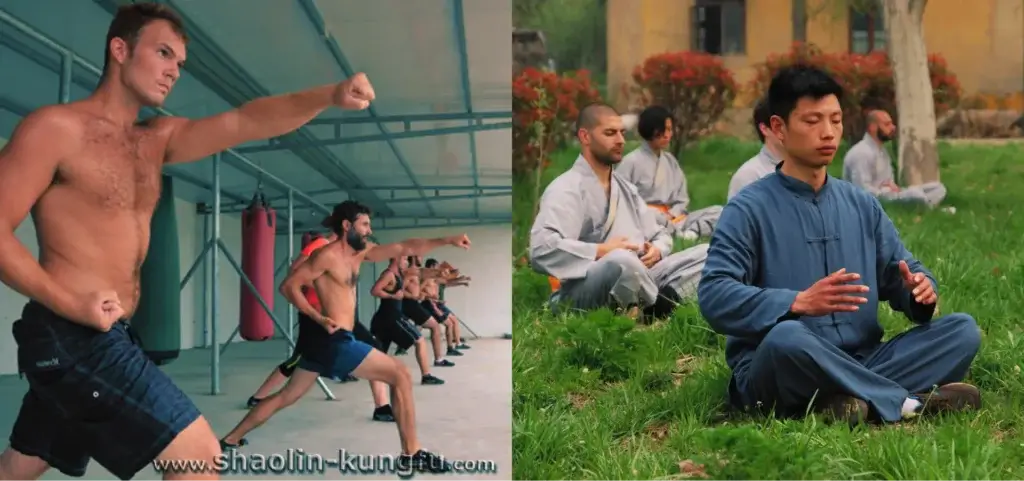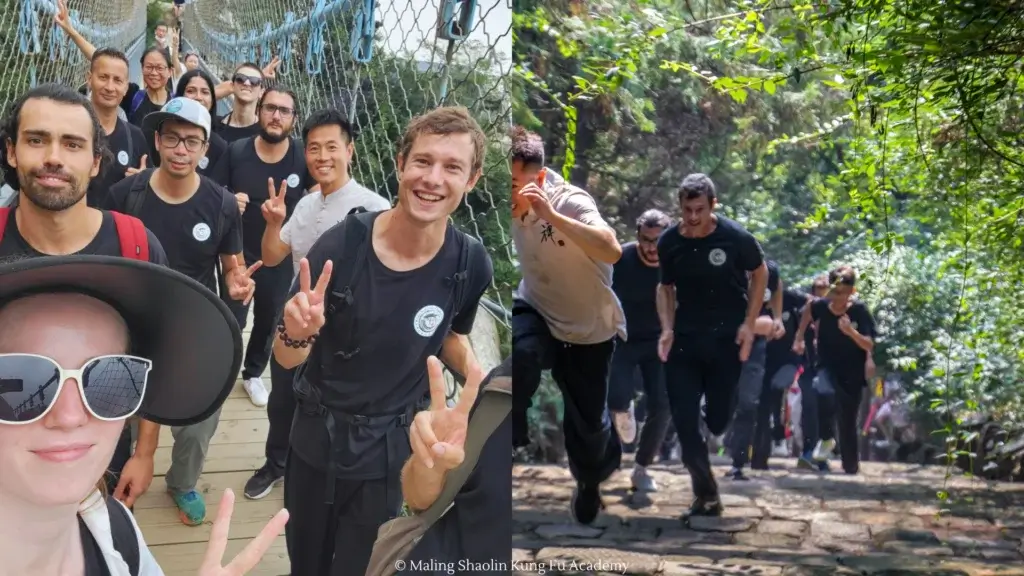
Remote living has been on the rise for the last decade, accelerated by the global pandemic, and this trend is expected to continue into 2025 and beyond. According to the State of Remote Work report by Buffer, over 30% of workers globally were working remotely full-time as of 2023, with 25% of people expecting to be fully remote in the coming years. The flexibility of remote work allows individuals to live in locations with lower costs of living, which has fueled the appeal of rural China for those seeking a unique balance of affordability, culture, and personal growth. One of the best ways to take advantage of this is by combining remote work with the immersive experience of living at a kung fu school, where you can not only develop your physical health but also enrich your understanding of Chinese culture.
Remote Living Work Statistics:
- Global Remote Work Trends: According to the State of Remote Work report by Buffer, 36% of remote workers believe career growth is easier with remote work, a significant increase from 14% in the previous year.
- U.S. Remote Work Data: The U.S. Bureau of Labor Statistics reports that 35% of full-time employees worked remotely at least part-time in 2023, up from 34% in 2022.

Cost of Living: Rural China vs The West
In comparison to major Western countries, living costs in rural China, including locations like where Maling Shaolin Kung Fu Academy is situated, can be remarkably low. While rent in cities like Beijing and Shanghai can be expensive, rural areas provide affordable housing options, especially when living within a kung fu school setting. Here’s a breakdown of average costs:
- Rent: In rural China, living costs (including rent) can be as low as 20% of the cost in major Western cities. Rent for a modest apartment in rural China can cost between $100–$300 USD per month, while similar apartments in Western cities can easily exceed $1,500 USD.
- Utilities and Food: Monthly expenses for utilities (electricity, internet, etc.) and food are also significantly lower. You can live comfortably on around $200–$400 USD per month for essentials, including food and utilities, in rural China. In contrast, in the U.S. or Europe, this would be well over $1,000 USD.
- Transportation: Public transportation is inexpensive, with bus and subway fares costing just a few yuan per trip. If you need a car, gas prices are typically lower as well.
- Academy Living: The most economical option, living at a kung fu school in China typically covers accommodation, utilities, food, training, cultural classes, and, in some cases, even uniforms and group outings.
While the cost of living in China is quite low, the experience goes far beyond just financial savings.
Remote Living in China Cost Comparison:
- China vs. Western Countries: According to Livingcost.org, the average cost of living in China is $686, compared to $2,454 in the United States.
- Detailed Cost of Living by City: World Population Review provides a comprehensive comparison, showing that cities like New York City have a cost of living of $4,051, while cities in China like Chengdu have a cost of living of $660.
- Kung Fu School Tuition: Tuition at Maling Shaolin Kung Fu Academy ranges from $500-$700 per month, providing all the necessities for living, training, and working remotely at a fraction of the cost of life abroad and an even cheaper rate than the average cost of living for Chinese locals (as seen above).
Internet Connectivity & Misconceptions

One of the most common misconceptions about living in China as a remote worker is the assumption that internet access is severely restricted or unreliable. While it’s true that China has a unique set of regulations regarding internet use, such as the “Great Firewall,” which can block access to certain websites like Google, Facebook, and Twitter, this does not mean that remote work is impossible, or even difficult.
- VPNs: The use of VPNs (Virtual Private Networks) is legal in China, though they must be downloaded outside the country before arrival. Often, remote workers in China use VPNs to access blocked websites and platforms without issues. It is important to note that VPNs are not illegal, but users should ensure that the VPN is downloaded beforehand, as some may not be available in Chinese app stores.
- WiFi Quality: WiFi in China is typically reliable and fast, especially in rural and semi-urban areas. Kung fu schools typically offer high-speed internet for students and staff. You can easily connect to remote work tools, attend virtual meetings, and stay productive.
- Security and Privacy: Contrary to the rumors, China does not “spy” or “steal” personal information. Many international businesses, including Microsoft, operate in China without requiring VPNs. While it’s always a good idea to stay mindful of data privacy, there’s no need for concern about using common international software in China.
For remote workers, the ability to access work tools and stay connected is crucial, and China offers robust infrastructure to support that need.
Connectivity and Resources:
- VPN Usage in China: VPNs are legal in China, but must be downloaded outside the country before arrival. Reddit’s r/chinalife provides up-to-date information on the best VPNS for China.
- WiFi Quality: WiFi in China is typically reliable and fast, allowing web surfing, streaming, and remote work. Many kung fu schools, including Maling Shaolin Kung Fu Academy, offer high-speed internet for students and staff.
- Data Privacy: Contrary to rumors, China does not “spy” or “steal” personal information. You can use the internet, access sensitive documents, and communicate freely, though using a VPN will increase your communication options.
The Benefits of an Active Lifestyle: Kung Fu and Cultural Immersion

Remote workers who live in a kung fu school like Maling Shaolin Kung Fu Academy not only save money but also benefit from a more active lifestyle. Here are the key advantages of incorporating kung fu into your daily routine:
- Physical Health: Working remotely often leads to a sedentary lifestyle, but practicing kung fu allows you to stay fit, flexible, and strong. Kung fu training includes a combination of strength exercises, martial arts forms, and mindfulness practices like Qi Gong and Tai Chi. These activities are ideal for combating the physical stagnation that can occur in a traditional office job.
- Mental Focus: Kung fu training also promotes mental clarity and focus, which can enhance productivity. The discipline and mental strength learned through martial arts can translate into better time management and efficiency in remote work.
- Cultural Immersion: Living in a kung fu school in China is also an opportunity to immerse yourself in Chinese culture. You’ll have direct exposure to local traditions, festivals, and Chinese philosophy, enriching your personal growth. Additionally, living in rural China presents a unique opportunity to learn the Chinese language—something that would be difficult to achieve in a Western country. Many schools, including Maling Shaolin Kung Fu Academy, offer Chinese Mandarin classes as part of their curriculum, providing a way to interact with local people and deepen your understanding of the country.
Training schedules at kung fu schools, like the one shown below, help balance work, physical activity, and rest, ensuring you maintain a healthy lifestyle:
| Time | Monday | Tuesday | Wednesday | Thursday | Friday |
| 6:00 – 7:00 (Optional) | Qi Gong & Tai Chi | Qi Gong & Tai Chi | Qi Gong & Tai Chi | Qi Gong & Tai Chi | Qi Gong & Tai Chi |
| 7:00 – 8:30 | Breakfast | Breakfast | Breakfast | Breakfast | Breakfast |
| 8:30 – 10:00 | Shaolin Basics | Acrobatics | Shaolin Basics | Dynamic Qi Gong | Power Stretching |
| 10:00 – 10:30 | Break | Break | Break | Break | Break |
| 10:30 – 11:30 | Traditional Forms | Applications | Traditional Forms | Conditioning | Traditional Forms |
| 11:30 – 14:30 | Lunch & Break | Lunch & Break | Lunch & Break | Lunch & Break | Lunch & Break |
| 14:30 – 16:00 | Sanda | Shaolin Take-Downs | Sanda | Power Training | Stamina Training |
| 16:30 – 17:30 (Optional) | Break / Additional Classes | Break / Additional Classes | Break / Additional Classes | Break / Additional Classes | School Cleaning |
| 18:00 | Dinner | Dinner | Dinner | Dinner | Dinner |
This training schedule allows you to stay physically active and culturally engaged while having ample time to work remotely in the afternoon, evening, and weekends.
Benefits of an Active Lifestyle:
- Physical Health: Engaging in regular physical activity, such as kung fu, can improve cardiovascular health, increase strength and flexibility, and reduce stress.
- Mental Focus: Practicing martial arts like kung fu promotes mental clarity and focus, which can enhance productivity.
- Cultural Immersion: Living in a kung fu school in China offers direct exposure to local traditions, festivals, and Chinese philosophy, enriching personal growth.
Work-Life Balance and Flexibility

One of the most appealing aspects of remote work is the flexibility it offers. Living in a kung fu school provides the best of both worlds: you can enjoy the serenity and focus required for productive work, as well as the energy and discipline of martial arts training. With structured days for both work and training, it’s easy to maintain a healthy work-life balance.
Kung fu training is not just about physical exercise. It’s also about personal development, discipline, and mental clarity, which can enhance your professional life. Furthermore, living in a community of like-minded people focused on self-improvement creates an encouraging atmosphere where you can thrive both personally and professionally.
In conclusion, for those seeking a cost-effective, culturally immersive, and physically active lifestyle, remote living in China at a kung fu school offers a unique and valuable opportunity. With low living costs, excellent internet connectivity, and the added benefits of martial arts training and Chinese language immersion, remote workers can enjoy a balanced and fulfilling life, both professionally and personally.





